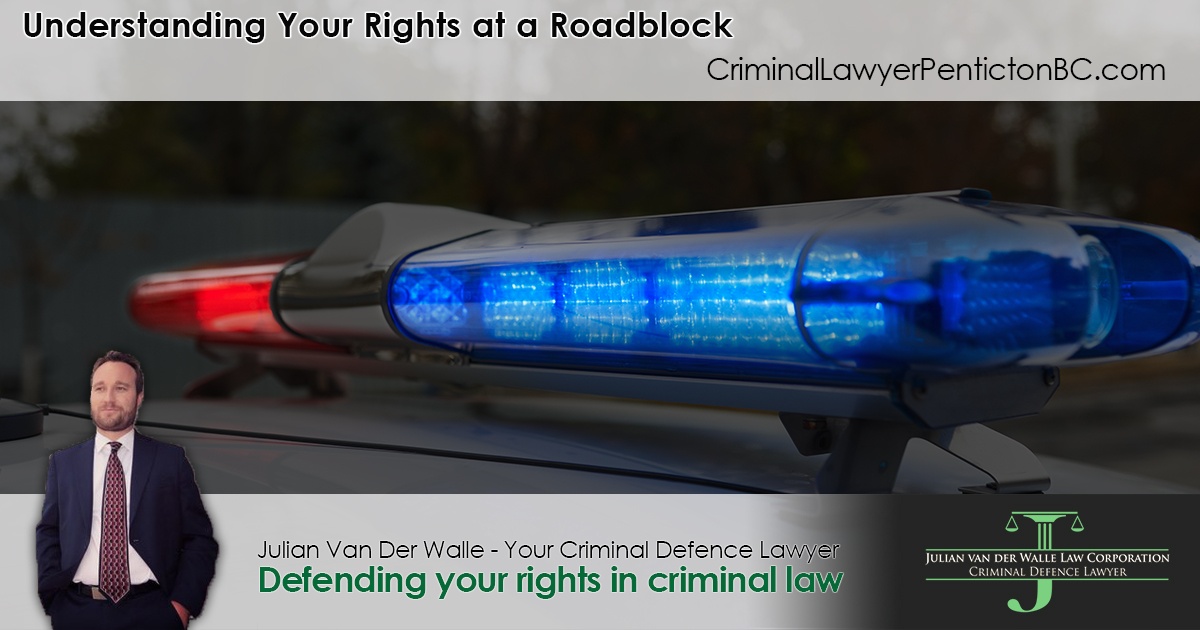Understanding Your Rights at a Roadblock

Roadblocks are a tool commonly used by the police in Canada to detect traffic infractions and alcohol violations on a large scale. In most cases, drivers will see roadblocks set up on major roads on holiday weekends or late at night around the time when bars begin to close. The roadblocks are a legal means of police traffic control, but they can become a legal problem for motorists who do not understand their rights when questioned by the police.
The experience of most motorists at roadblocks includes merely an identification, registration, and insurance check. However, depending on the circumstances, the police have the authority to ask additional questions. For example, if the police suspect that the driver is intoxicated, they may ask whether the driver has consumed any alcohol. Similarly, if the police smell marijuana, they may ask about the presence of narcotics in the vehicle. Confrontations with police like these at roadblocks can quickly escalate to an arrest if you do not understand your rights. This article seeks to shed some light on both the extent of actual police power at roadblocks and your rights as a driver when questioned.
The Legal Authority for Roadblocks in British Columbia
The Motor Vehicle Act is a law that governs the regulation and punishment of traffic offenses in Canada. In addition to stating the laws related to traffic offenses, however, it also grants the police authority to set up roadblocks to screen for illegal activity. This authority has been considerably constrained by the Supreme Court of Canada. The Supreme Court has ruled that police authority is limited to asking for license, registration, and insurance information at roadblocks unless the police suspect ongoing criminal activity. In the most famous case involving roadblocks, R v. Mellenthin, the Supreme Court of Canada ruled that unless there are further reasonable and probable grounds to suspect a crime, officers at roadblocks should only check for:
- sobriety;
- licensure;
- ownership;
- insurance; and
- the mechanical fitness of the vehicle.
Rights at a Roadblock: the Right to Remain Silent
As the Supreme Court of Canada has constrained the police’s authority at roadblocks, all motorists have certain rights when dealing with police in the context of a roadblock. The most important of those rights is the right to remain silent and not answer any questions that you do not have to answer. As explained above, the police are only legally allowed to ask questions about five different topics unless they suspect some other ongoing criminal activity. Therefore, you should feel comfortable not answering any other questions asked by the police at a roadblock.
That said, most police questions are well-intentioned, and there is certainly nothing wrong with having a friendly chat with a roadblock police officer. The important thing to remember is that you can stay silent if you feel that you need to do so.
Police Suspicions and Roadblock Encounter Escalations
There are many different ways that police officers at a roadblock can begin to suspect criminal activity. For example, a police officer could smell fragrant narcotics like marijuana or the officer could spot contraband by looking through your vehicle windows. If police suspect ongoing criminal activity, they are allowed to ask additional questions and pursue a criminal investigation. That said, there are legal rules that govern these additional police searches, and when police do not follow those rules, you can challenge any legal action taken against you.
The most common violations of the rights of motorists occur where the police begin a full investigation despite having only a mere suspicion of wrongdoing. While a mere suspicion allows the police to ask additional questions, it does not allow the police to either search the vehicle or search the motorist. In other cases, evidence gathered at roadblocks can be suppressed in court if the roadblock was improperly set up.
Avoiding the Roadblock or Fleeing from the Roadblock
Generally, speaking, it is not a good idea to avoid or flee from a roadblock if you have nothing to hide. That said, regardless of your reasons for choosing to do so, you are generally allowed to avoid a police roadblock by turning down side streets. If you are already approaching a roadblock, however, it is not a good idea to take sudden evasive maneuvers such as making a U-turn to avoid the roadblock. It is always illegal to flee from a police roadblock once you have been stopped by the police.
Related Stories
Why You Should Hire a Vernon Criminal Defense Attorney
As a whole, the Canadian justice system is very fair. The accused enjoy the right to be present and be heard in court, the right to remain silent, and the right to representation by legal counsel. That last right is one of the most important rights of all. This is...
Does drug addiction cause more crime?
Many in Canada often associate drugs with crime, and in many cases, the possession or use of drugs is itself a crime. More recently, a spotlight has been placed on drug-related incidents due to the opioid crisis afflicting the nation. Sociologists have spent decades...
Bad IRP Decision? What Can You Do About It?
Bad IRP Decision? What Can You Do About It? Drivers who are caught driving under the influence by the police may receive an Immediate Roadside Prohibition (IRP) on driving. An IRP is a temporary driving suspension that prevents the recipient from driving for a set...
REQUEST A FREE CONSULTATION
Call 1.866.706.8857
Or fill out the form below to receive a free and confidential initial consultation.
